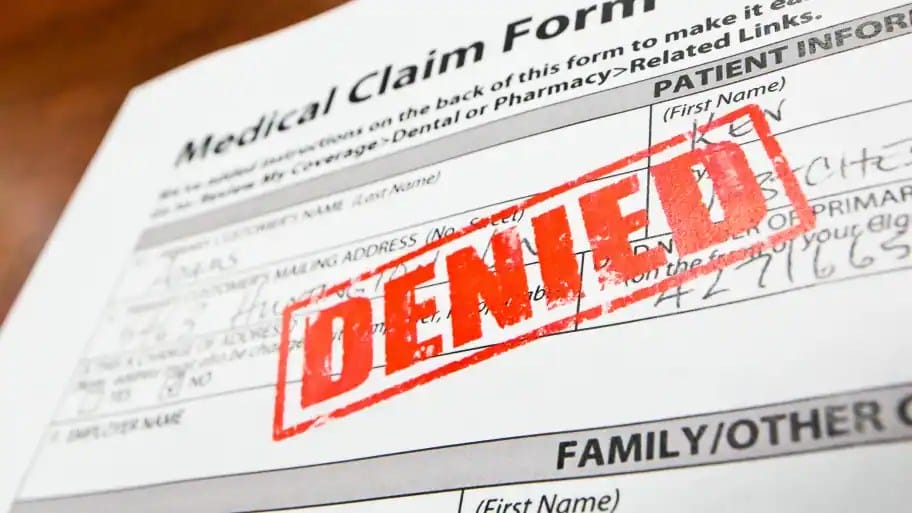Navigating the complexities of health insurance claims can be a daunting task, especially when faced with a denied claim. Understanding the reasons behind denied claims and learning the strategies to effectively appeal them is crucial for ensuring access to necessary medical care.
This comprehensive guide delves into the intricacies of appealing denied health insurance claims, empowering individuals with the knowledge and tools to advocate for their rightful coverage.
With a step-by-step approach, we will explore the process of appealing denied claims, from deciphering denial codes to gathering supporting documentation. We will delve into the art of crafting a compelling appeal letter, outlining key strategies for presenting a strong case.
Additionally, we will discuss the various methods for submitting an appeal, ensuring timely processing and tracking its status.
Understanding Denied Health Insurance Claims

Navigating the complexities of health insurance claims can be challenging, and encountering a denied claim can be frustrating. Understanding the reasons behind denied claims is crucial for patients to advocate for their rights and potentially overturn the denial.
Common Reasons for Denied Claims
Health insurance claims can be denied for various reasons, including:
- Lack of Coverage: The service or treatment may not be covered under the patient’s health insurance plan.
- Missing or Incomplete Information: Incomplete or incorrect claim forms, lack of supporting documentation, or missing signatures can lead to denied claims.
- Medical Necessity: The insurance company may determine that the service or treatment was not medically necessary or appropriate for the patient’s condition.
- Pre-existing Conditions: If the condition being treated is considered a pre-existing condition, coverage may be limited or denied.
- Provider Network: Seeking care from a provider outside the insurance company’s network may result in denied claims.
Examples of Denied Claims and Their Reasons
- Claim Denied Due to Lack of Coverage: A patient’s claim for a chiropractic treatment may be denied if chiropractic care is not covered under their health insurance plan.
- Claim Denied Due to Incomplete Information: A claim for a surgery may be denied if the surgeon’s notes and operative report are not included with the claim form.
- Claim Denied Due to Medical Necessity: A claim for a prescription drug may be denied if the insurance company determines that the drug is not medically necessary for the patient’s condition.
Importance of Understanding Denial Codes and Explanations of Benefits (EOBs)
Understanding denial codes and explanations of benefits (EOBs) is essential for patients to comprehend the reason for the claim denial and to challenge it if necessary.
Denial Codes: Insurance companies use specific denial codes to indicate the reason for denying a claim. These codes can help patients identify the exact issue that led to the denial.
Explanations of Benefits (EOBs): EOBs provide a detailed explanation of the claim, including the services covered, the amount paid by the insurance company, and the amount the patient is responsible for.
By carefully reviewing denial codes and EOBs, patients can gain valuable insights into the reason for the claim denial and take appropriate action to address it.
Reviewing the Claim Denial Notice
A thorough review of the claim denial notice is paramount to understanding the reasons for denial and determining the next steps. This document serves as a valuable tool in identifying critical information, such as the date of service, the amount denied, and the specific reason for denial.
Identifying Key Information
Carefully examine the denial notice to locate the following crucial details:
- Date of Service: This indicates when the medical service or procedure was provided.
- Amount Denied: This specifies the exact amount of the claim that was denied.
- Reason for Denial: This section explains why the claim was denied. It is essential to pay close attention to the specific wording used, as it may provide valuable insights into the denial.
Understanding Complex or Ambiguous Notices
In some cases, denial notices may be complex or ambiguous. If you find it challenging to understand the reason for denial, consider taking the following steps:
- Contact Your Health Insurance Provider: Reach out to your health insurance provider’s customer service department and request clarification regarding the denial notice. They may be able to provide additional information or guidance.
- Seek Professional Assistance: If you are still unable to comprehend the denial notice, consider consulting with a healthcare advocate or an attorney specializing in health insurance matters. They can help you interpret the denial notice and determine the best course of action.
Gathering Supporting Documentation
An essential step in appealing a denied health insurance claim is gathering supporting documentation. These documents provide evidence and strengthen your case for reconsideration. It’s crucial to be organized and maintain accurate medical records, as they serve as the foundation for your appeal.
Obtaining Supporting Documentation
To obtain additional documentation, you can contact the healthcare providers or facilities involved in your treatment. Be prepared to provide relevant information, such as the dates of service, the type of care received, and the names of the healthcare professionals involved.
You may also need to sign a release form authorizing the release of your medical records.
Writing an Appeal Letter

To appeal a denied health insurance claim effectively, it’s crucial to craft a well-structured and persuasive appeal letter. Follow these steps to ensure your letter addresses all essential aspects:
Step 1: Gather Necessary Information
Before writing the appeal letter, ensure you have gathered all relevant information related to your claim, including the denial notice, supporting documentation, and any communication you’ve had with the insurance company.
Step 2: Review the Denial Notice
Read the denial notice thoroughly to understand the specific reason for the claim denial. Identify the section that explains the basis for the denial, as this will help you address it in your appeal letter.
Step 3: Organize Your Appeal Letter
Structure your appeal letter in a clear and organized manner. Typically, it should include the following sections:
- Introduction: Briefly introduce yourself and provide your policy information.
- Statement of Appeal: Clearly state that you are appealing the denied claim and provide the claim number.
- Explanation of Denial Reason: Address the reason for the denial as stated in the denial notice. Provide evidence or arguments to refute the denial.
- Supporting Evidence: Attach relevant documentation to support your appeal, such as medical records, treatment plans, and receipts.
- Request for Reconsideration: Politely request the insurance company to reconsider the claim based on the evidence provided.
- Conclusion: Summarize your appeal and reiterate your request for reconsideration.
Step 4: Express Willingness to Work with the Insurance Company
Demonstrate your willingness to work with the insurance company to resolve the issue. Mention that you are open to further discussions or providing additional information if necessary.
Step 5: Submit the Appeal Letter
Send the appeal letter to the insurance company using the method specified in the denial notice. Keep a copy of the letter and all supporting documentation for your records.
Submitting the Appeal

Once you’ve gathered the necessary information and composed your appeal letter, it’s time to submit it to your insurance company. Several methods are available, each with its own advantages and disadvantages.
Methods of Submitting an Appeal
The most common ways to submit an appeal are:
- Mail: Sending your appeal letter via certified mail with a return receipt provides a record of the date and time of submission. It is a reliable method, but it may take longer for the insurance company to receive and process your appeal.
- Fax: Faxing your appeal letter is a quick and convenient option, especially if you need to submit it urgently. However, it is important to ensure that the fax is sent successfully and that the insurance company receives it.
- Online Portals: Many insurance companies offer online portals where you can submit your appeal electronically. This method is often the fastest and most efficient, as it allows the insurance company to process your appeal more quickly.
Regardless of the method you choose, ensure you meet the deadline for submitting the appeal. This deadline is usually stated in the claim denial notice or on the insurance company’s website. Failure to meet the deadline may result in your appeal being rejected.
Tracking the Status of the Appeal
Once you’ve submitted your appeal, you’ll want to track its status to ensure it’s being processed. Here are a few tips:
- Keep a copy of your appeal letter: This will help you if you need to refer to it later or if you need to follow up with the insurance company.
- Contact the insurance company: If you haven’t heard back from the insurance company within a reasonable amount of time, call or email them to inquire about the status of your appeal.
- Be persistent: Don’t be discouraged if your appeal is initially denied. You may need to follow up with the insurance company several times before your appeal is approved.
By following these tips, you can increase your chances of successfully appealing a denied health insurance claim.
Understanding the Appeals Process

The appeals process for denied health insurance claims typically involves a series of steps designed to review and reassess the claim. These steps aim to ensure a fair and thorough evaluation of the claim, considering additional information and perspectives.
Internal Appeals
The initial step in the appeals process is often an internal appeal. This involves submitting a formal appeal to the health insurance company that denied the claim. The appeal should include relevant documentation, medical records, and a clear explanation of why the claim should be approved.
The insurance company will review the appeal and may request additional information or clarification.
External Appeals
If the internal appeal is denied, the next step is to file an external appeal. This involves submitting the appeal to an independent third party, such as a state insurance department or an external review organization. The external reviewer will conduct a thorough review of the claim, considering all relevant information and evidence.
They will then issue a decision, which may uphold the denial, approve the claim, or partially approve it.
Potential Outcomes
The appeals process can result in several potential outcomes:
- Approval: The claim is fully approved, and the insurance company pays the benefits.
- Denial: The claim is denied again, and the insurance company does not pay any benefits.
- Partial Approval: The claim is partially approved, and the insurance company pays a portion of the benefits.
Dealing with Claim Denials Due to Pre-existing Conditions

Navigating claim denials related to pre-existing conditions requires strategic action and comprehensive documentation. Successfully appealing such denials hinges on demonstrating that the condition was stable and controlled prior to coverage.
Understanding the Significance of Demonstrating Stability and Control
Insurance companies often deny claims for pre-existing conditions, citing that the condition existed before coverage began. To counter this, it’s crucial to prove that the condition was stable and under control before the policy was obtained. This evidence helps establish that the condition did not arise during the coverage period and is, therefore, covered by the policy.
Gathering Medical Records and Documentation
Compiling medical records and documentation plays a pivotal role in supporting appeals for pre-existing conditions. These records should clearly illustrate the stability and control of the condition before coverage commenced. Relevant documentation includes:
- Medical history summaries
- Physician notes
- Test results
- Medication records
- Specialist reports
- Discharge summaries
Ensure that the documentation covers a period prior to the effective date of the insurance policy.
Handling Claim Denials for Experimental or Investigational Treatments
Challenging claim denials for experimental or investigational treatments demands careful navigation and strategic planning. Here’s how you can effectively appeal such denials:
Substantiating Medical Necessity
Appealing claim denials for experimental treatments hinges on demonstrating medical necessity. Gather comprehensive medical records, including test results, specialist opinions, and treatment plans, to prove the therapy’s necessity for your condition.
Presenting Evidence of Potential Benefits
Compile evidence supporting the potential benefits of the treatment. Include research studies, clinical trials, and expert opinions highlighting its efficacy and safety profile. Document how the treatment aligns with accepted standards of medical practice.
Collaborating with Healthcare Providers
Work closely with your healthcare providers to obtain detailed documentation justifying the experimental treatment’s necessity. Request letters from your doctor explaining why standard treatments have failed and why the experimental treatment is the best course of action.
Seeking External Review

If the internal appeals process does not yield a favorable outcome, you can consider seeking an external review of your denied health insurance claim.
An external review is an independent review of your claim by a third party, typically a medical professional or an independent review organization (IRO).
Requesting an External Review
To request an external review, you will need to submit a written request to your health insurance company. The request should include the following information:
- Your name and contact information
- Your health insurance policy number
- The claim number of the denied claim
- A copy of the claim denial notice
- A statement explaining why you believe the claim should be covered
- Any supporting documentation that you have, such as medical records or receipts
Your health insurance company will then send you a form to complete. The form will ask for additional information about your claim, such as the date of service, the provider who performed the service, and the amount of the claim.
Role of Independent Reviewers
The independent reviewers who conduct external reviews are typically medical professionals or experts in health insurance. They will review your claim and all of the supporting documentation that you have submitted. They will then make a decision about whether or not the claim should be covered.
The decision of the independent reviewers is binding on your health insurance company. If the reviewers decide that the claim should be covered, your health insurance company will be required to pay the claim.
Benefits and Limitations of External Reviews
There are several benefits to seeking an external review of a denied health insurance claim. These benefits include:
- An independent review can provide you with a fresh perspective on your claim.
- The reviewers may have more expertise in your particular medical condition than the health insurance company’s employees.
- The external review process is typically more transparent than the internal appeals process.
However, there are also some limitations to external reviews. These limitations include:
- The external review process can be time-consuming.
- There is no guarantee that the reviewers will overturn the health insurance company’s decision.
- You may have to pay a fee to file an external review.
Preventing Future Claim Denials

To minimize the chances of future claim denials, it’s crucial to stay informed about your insurance coverage and limitations, maintain open communication with healthcare providers, and ensure accurate and timely claim submissions.
Understanding Insurance Coverage and Limitations
Familiarize yourself with your insurance policy, including covered services, exclusions, and any applicable limitations or restrictions. Review your policy regularly and stay updated on any changes that may affect your coverage.
Communication and Coordination with Healthcare Providers
Maintain open communication with your healthcare providers. Provide them with accurate and complete information about your medical history, current symptoms, and any relevant documentation. Encourage them to use the correct codes and modifiers when submitting claims to your insurance company.
Accurate and Timely Claim Submissions
Ensure that claim forms are filled out correctly and completely. Include all necessary information, such as patient demographics, diagnosis codes, procedure codes, and dates of service. Submit claims promptly to avoid any delays or denials due to late filing.
Pre-Authorization and Pre-Certification
When required, obtain pre-authorization or pre-certification from your insurance company before undergoing certain procedures or treatments. This helps ensure that the services are covered under your plan and reduces the risk of claim denials.
Maintain Medical Records
Keep detailed and organized medical records, including test results, doctor’s notes, and receipts. These records can be invaluable in supporting your appeal if a claim is denied.
Review Explanation of Benefits (EOB) Statements
Carefully review your Explanation of Benefits (EOB) statements to identify any errors or discrepancies. Contact your insurance company promptly if you have questions or concerns about a claim denial.
Seek Professional Assistance
If you’re experiencing repeated claim denials or have complex medical needs, consider seeking assistance from a healthcare advocate or insurance advisor. These professionals can help you navigate the appeals process and ensure your rights are protected.
Last Word

Appealing denied health insurance claims requires persistence, attention to detail, and a thorough understanding of the appeals process. By following the comprehensive strategies Artikeld in this guide, individuals can significantly increase their chances of a successful appeal. Remember, advocating for your health insurance coverage is not just a right but a necessity in safeguarding your access to quality healthcare.
Take charge of your health insurance journey and confidently navigate the appeals process with the knowledge and tools provided in this guide.
FAQ Section
What is the most common reason for denied health insurance claims?
The most prevalent reason for denied health insurance claims is the lack of prior authorization for certain procedures or treatments.
What is the significance of understanding denial codes and EOBs?
Understanding denial codes and EOBs (Explanations of Benefits) is essential for identifying the specific reason for the claim denial and the amount covered or denied.
How can I obtain additional documentation from healthcare providers or facilities?
Contact the healthcare provider or facility directly and request the necessary documentation. Provide them with the claim number and relevant information to expedite the process.
What is the recommended approach for writing an effective appeal letter?
Craft a clear and concise appeal letter that Artikels the reason for the denial, provides supporting evidence, and expresses willingness to work with the insurance company to resolve the issue.
What are the different methods for submitting an appeal?
Appeals can be submitted via mail, fax, or through online portals provided by the insurance company. Make sure to meet the deadline for submitting the appeal.



